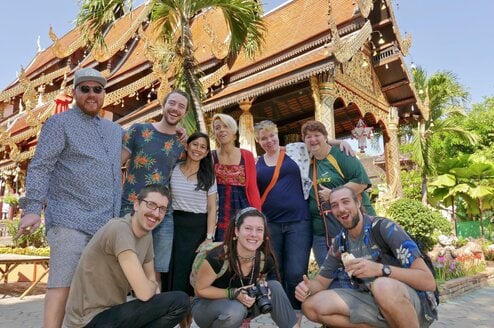What position do you hold at SEE TEFL? What has been your career path so far?
John: I am the founder, director of the managing company and the senior trainer for SEE TEFL. In addition, all email inquiries are sent to me and receive my personal response. Before I became an EFL teacher in 1999, I had always been searching for this type of career. Until that point in my life, I had mixed shoestring travel with spells of unsatisfying employment in the UK. My ‘eureka’ moment was during a bus journey in India; I met two vacationing TEFL teachers and they told me about their lives as EFL teachers in Bangkok.
I had never heard of TEFL before, and this seemed like the perfect career for me. It would allow me to continue to travel to far and exotic countries while doing something worthwhile with my life. Teaching, along with nursing, had always appealed to me as it would involve working with people and not paper or computer files.

The first step would be to take a TEFL course and I had been instructed by my new TEFL friends that the Saturday Education supplement of The Guardian newspaper would list upcoming courses. While there were only three listed, there was one was at a college just 500m from my parents’ house (where I was staying) and it was starting in 10 days. My brother-in-law, who is a builder, asked me whether I was interested in 7 days cash-in-hand work on one of his sites. I did, and I started to believe in fate from this moment.
Did YOU teach abroad?! If so, where and what inspired you to go?
John: I started my teaching career in Chiang Mai as an hourly-paid part-time teacher. After 2 years, it was time to move on and my next step was a 2-year full-time contract at the British Council. After another year of teaching the same verb tenses to mainly elementary-level students, I felt it was time for a new challenge. I grabbed the opportunity during my time at the BC to become an IELTS examiner and start leading IELTS strategy classes.
Upon completion of this contract I took 6 months off to go traveling around SE Asia. On returning to Chiang Mai, I was offered the position of Director of Studies at a branch of EF. We taught in-house, and I also managed teachers who we contracted to formal schools.
My next move was to open my own EFL language school in Chiang Mai – SEE TEFL started running courses in 2006. Since this date, we have refined the content, developed relationships with a large number of schools, achieved ISO 9001 compliance and obtained recognition from the Thai Ministry of Education for our program. We’ve also trained close to 700 TEFL teachers.
What does the future hold for SEE TEFL - any exciting new programs to share?
John: We ran our first Internship program in September 2013. This is a program that is suitable for people who are not fully committed to a career change. It offers training and a job guarantee for a 4-5 month placement in a Thai rural school. We are also looking to work with a partner and open the SEE TEFL program in Bangkok and at a beach location. We will then have courses in the Thai cultural capital of Thailand, the business centre and one next to the sea.
What about the future of the TEFL abroad industry? How do you think international education will change over the next 10 years?
John: Ten years ago many people predicted online courses were the future of TEFL. I was never convinced. Practical teaching skills can only be acquired through practical-skills training. Our focus is always on developing practical skills. I think most people thinking of TEFL recognize this as well. In addition, I predict ISO 9001 compliance will be adopted by more programs over the next 10 years. This is the only externally audited quality-management standard recognized around the world. It’s a guarantee of quality in teacher training courses.










